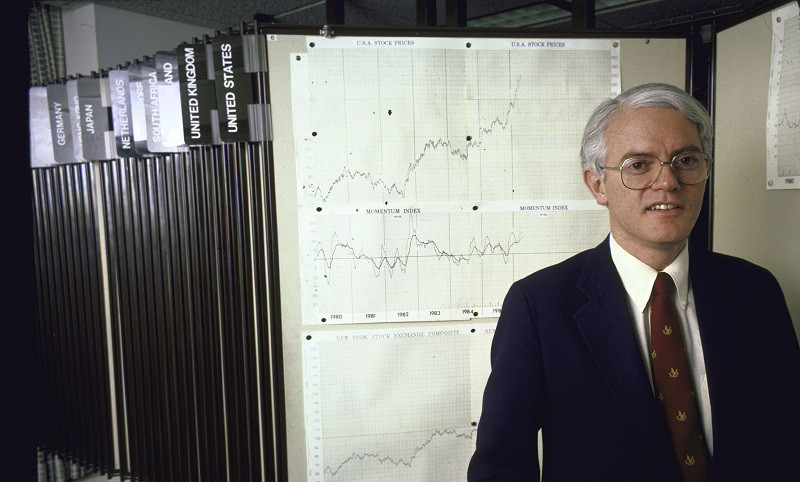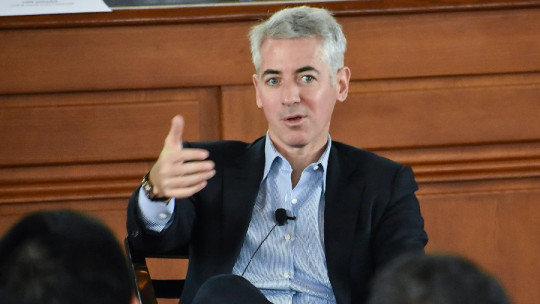Peter Lynch is known for being one of the most important businessmen and investors in the United States, thanks to his work as manager of the Magellan fund at Fidelity Investments. He has shared his experience and tricks through his books on finances and investments.
To understand his way of thinking and understanding the world of investments and business, here we will review the best quotes from Peter Lynch commented.
The most memorable Peter Lynch quotes
To find out how this man became an investment star in the hectic world of finance, we bring you a compilation of the best phrases and reflections of Peter Lynch.
1. Know what you have and understand why you have it.
You can’t have something without knowing the reasons behind it.
2. Just because you like a product or a store is not a sufficient reason to invest in its shares.
Investments are businesses and they are not managed by appearance.
3. The key to making money with stocks is not to be afraid of them.
The world of investments is a constant risk to win.
4. Behind every action there is a company. Find out what he does.
Every company can offer something interesting for you.
5. You can lose money in the short term, but you need the long term to make money.
It is unthinkable to pretend that you are going to make money overnight when you invest.
6. It is important to learn that there is a company behind every stock and there is only one real reason why stocks go up.
Stocks rise when the quality of a company becomes known.
7. If you don’t analyze companies, you have the same chance of success as a poker player betting without looking at the cards.
This is a business that requires a lot of time to study and get to know the company you want to bet on.
8. Although it’s easy to forget, sometimes, a share isn’t a lottery ticket… it’s part ownership of a business.
Many believe that getting into the investment business is a quick ticket to becoming a millionaire.
9. The asset will continue to beat the market.
Talking about active actions versus passive actions.
10. If you don’t understand a company, if you can’t explain it to a ten year old in 2 minutes or less, don’t own it.
Lynch’s persistent advice is that we can’t have a business we don’t understand.

11. Investing in stocks is an art, not a science, and people who have been trained to rigidly quantify everything are at a major disadvantage.
It is not about knowing entirely about numbers, but about knowing how to read the opportunities that come to you.
12. You get all the math you need in the stock market in fourth grade.
A reference to basic mathematics being the only one really needed for investing.
13. Investors have lost far more money preparing for corrections, or trying to anticipate corrections, than has been lost in the corrections themselves.
Another thing you have to learn to read is when it is necessary to withdraw.
14. The trick is not to learn to trust your instincts, but to discipline yourself to ignore them.
In this business what counts is to think with a cold and calm mind.
15. Never invest in an idea that you can’t illustrate with a crayon.
The less you understand about a business, the fewer rewards you will have from it.
16. Most investors would be better off in an index fund.
Not all people who think they are investors really are.
17. In actions, as in romance, the ease of divorce is not a solid basis for commitment.
To enter the world of actions, it is necessary to commit yourself through the good and the bad.
18. It’s human nature to keep doing something as long as it’s enjoyable and you can be successful at it, which is why the world’s population continues to double every 40 years.
Doing what we love is an almost primary objective, but we must also guard against getting carried away by greed.
19. Stocks are a safe bet, but only if you stay invested long enough to ride out corrections.
You have to think long-term about investments, since there are no favorable results in the short term.
20. Never invest in a company without understanding its finances.
A mistake that many people interested in stocks apparently make.
21. Except in cases of big surprises, actions are quite predictable over twenty-year periods. As to whether they are going to go up or down in the next two or three years, it is the same as flipping a coin.
Another phrase that reminds us that these types of investments take years to reap their benefits.
22. Remember, things are never clear until it’s too late.
That is why it is so necessary to learn to analyze and anticipate.
23. Everyone has enough brains to make money in the stock market, but not everyone has enough stomach.
Many have the courage to start but not the courage to stay and wait.
24. The best company to buy may be one that you already have in your portfolio.
For Lynch, what is known can be an advantage.
25. If you spent more than thirteen minutes discussing economic and market forecasts you wasted ten minutes.
Forecasts are often misleading.
26. If you like the store, you’re probably going to like the action.
Investment also needs passion.
27. Time is on your side when you own shares of top companies.
A way to ensure the future.
28. Just because you buy a stock and it goes up doesn’t mean you’re right. Just because you buy a stock and it goes down doesn’t mean you’re wrong.
The market is never static and that is why it is always going up and down constantly.
29. People who are successful in the stock market also accept periodic losses, setbacks, and unexpected events. Dire drops don’t scare them out of the game.
To enter this world it is necessary to learn to accept failures, but especially, know how to learn from them.
30. Owning stocks is like having children: Don’t get involved with more than you can handle.
An interesting comparison.
31. The extravagance of any corporate office is directly proportional to management’s reluctance to reward shareholders.
As the saying goes, ‘all that glitters is not gold.’
32. There is no shame in losing money on a stock. Everybody does it. What’s embarrassing is holding on to a stock, or worse, buying more when the fundamentals are deteriorating.
You have to learn when to leave a stock and walk away.
33. The person who turns over the most stones wins the game. And that has always been my philosophy.
It’s about knowing and putting into practice what you have learned.
34. No one can predict interest rates, the future direction of the economy, or the stock market. Throw away all those forecasts and focus on what’s really happening to the companies you’ve invested in.
Forecasts are usually not correct, so you have to focus on the benefits that the company offers.
35. The biggest losses in the stock market come from companies with poor balance sheets.
Businesses that do not know how to correctly manage their finances.
36. People don’t have the patience to get rich slowly, so they decide to go bankrupt quickly.
Patience and consistency are the necessary tools to survive in this world.
37. The stock market is not like golf, in the stock market amateur investors can beat the professionals.
You should never be completely confident or insecure.
38. If management is buying shares in their own company, you should do the same.
A smart move to copy.
39. In this business, if you’re good, you’re right six times out of ten. You’re never going to get it right nine times out of ten.
You have to keep in mind that you are not going to win all the time.
40. The simpler it is, the more I like it.
The simple things are sometimes the ones that are best used.
41. Go for a business that any idiot can run, because sooner or later any idiot will probably run it.
It is necessary to cover all the possibilities that companies may go through.
42. Average investors can become experts in their own field and can pick winning stocks as effectively as Wall Street professionals with just a little research.
Lynch insists that the most necessary thing is knowledge.
43. The biggest winners are surprises to me, and the acquisitions are even more surprising.
A result that does not occur as frequently as one thinks.
44. The Rule of 72 is useful in determining how fast money will grow. Take the annual return on any investment, expressed as a percentage, and divide it by 72. The result is the number of years it will take to double your money.
A very useful method to know where to go.
45. A stock market crash is as routine as a January snowstorm in Colorado.
True falls, those where there is a risk of bankruptcy, do not happen very often.
46. There is often no correlation between the success of a company’s operations and the success of its actions for a few months or even a few years.
Everything in business, whether small or big, needs time to see profits.
47. Companies go from bad performance to good or small companies grow to become large.
The growth of companies according to Lynch.
48. Hold your shares as long as the company’s fundamental history has not changed.
As long as everything stays at the same pace, it’s fine.
49. If you are one of those who is likely to sell your entire portfolio in times of market panic, it is better not to invest in stocks.
The world of investments is not for anxious people.
50. If you are prepared to invest in a company, then you should be able to explain why in simple language that a fifth grader can understand, and quickly enough that the fifth grader won’t get bored.
If this is impossible, then this business is not for you.
51. Don’t follow my steps, because even if you get it right when it comes to buying, you won’t know when to sell.
Lynch offers a basic guide, but each investor must find their own path.
52. It takes years, not months, to produce great results.
As already mentioned, it is a business whose fruits are seen after a long time.
53. If you are prepared, it can’t hurt you. A crash is a great opportunity to take advantage of the bargains left behind by investors fleeing the storm in panic.
A practical way to see market declines.
54. In the long run, it is not just the amount of money you earn that will determine your future prosperity. It’s how much of that money you put to work by saving and investing it.
It is a process that is in continuous growth, recover and invest.
55. Try to avoid buying hot stocks in hot industries.
The worst time to invest according to Lynch.
56. Not all investments are equal.
As they are unique companies, each business is different.
57. When you sell desperately, you always sell cheap.
Worries make us take impulsive actions that are not beneficial.
58. Observe companies on the street that are having success and that you consider their products to be wonderful. With this technique you can discover excellent investment opportunities much sooner than the professionals.
A very wise and controlled way to listen to our instincts.
59. That’s not to say that an overvalued market doesn’t exist, but there’s no point in worrying about it.
Like everything, there are overrated brands that don’t need more attention.
60. You have recessions, you have stock market crashes. If you don’t understand what’s going to happen, then you’re not ready, you won’t do well in the markets.
In the market you can be up one day and down the next.
61. Big companies have small movements, small companies have big movements.
Never underestimate the power of companies because of their size.
62. All the time and effort that people put into choosing the right fund, the hot hand, the great manager, in most cases, has not led to any advantage.
It is difficult for there to be letters in favor of an investor, only information that can be taken advantage of.
63. When people discover that they are not good at picking stocks, they are likely to continue doing so anyway.
Not everyone has the ability to be good investors.
64. Don’t hold more stocks than you can stay informed about.
It is better to have a few stocks that are known inside out.
65. My method of picking stocks has never changed. When companies go from bad to semi-bad, money can be made.
It’s about knowing how to take advantage of the right opportunity.
66. There is no such thing as a worry-free investment. The trick is to separate the valid concerns from the idle ones and then check them against the facts.
There will always be a certain degree of anxiety because they are risky bets, which is why it is necessary to learn to control ourselves.
67. The natural investor is a myth.
The investor is a person who is created after many studies and market knowledge.
68. You can’t see the future using the rearview mirror.
Even in this type of business, the most important thing is to move forward.
69. You only need a few good actions in your life. I mean, how many times do you need a stock to increase tenfold to make a lot of money? Not much.
It is better to focus on a few things to do them well than to have thousands of actions and leave half of them for nothing.
70. Invest in stocks before any other asset.
Some advice on where we should focus our money.









